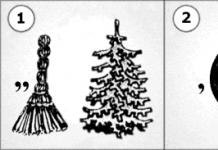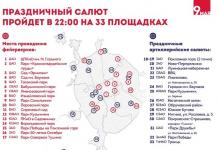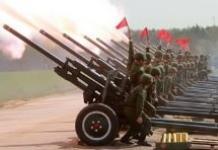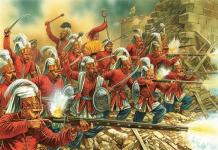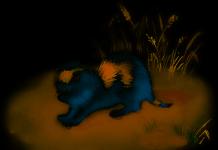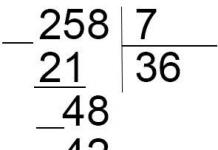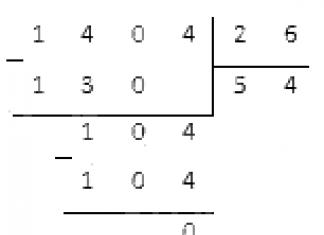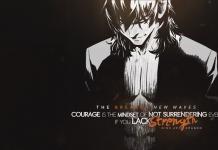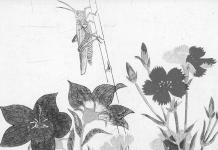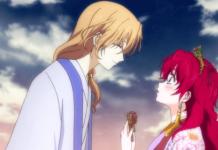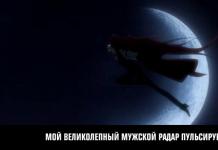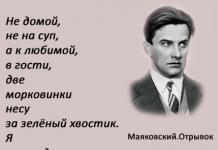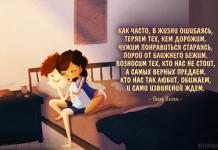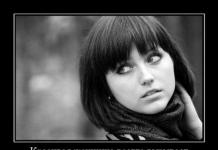The thought that work of fiction contains several hierarchically constructed levels, is well known 1 . Here, among other things, we can talk about different levels of understanding, when several meaningful interpretations correspond to the same text, sometimes reaching the opposite (if the invariant is not necessary).
In the aspect of perception, by analogy with the grammar of the speaker and the grammar of the listener 2, in any work, at least two poles can be distinguished - the author's and the reader's. Ideally, the variant of the analysis carried out by the listener (the reader) should be adequate to the variant of the synthesis carried out by the speaker (the author). In modern literature (in particular, in poetry), play is often deliberately built precisely on the possibility of a discrepancy between synthesis and analysis, which in the past was considered as a significant defect in the work or its reader 3 .
Here, when analyzing one poetic text, an attempt is made to bring the level of the author (synthesis) into line with the level of the reader (analysis).
Although, in principle, any literary text can be used for this purpose, A. Akhmatova's "Poem without a Hero" was not chosen by chance: it is almost an example of deliberate multiplication of levels of understanding, when the synthesis is constructed in such a way as to make analysis as difficult as possible, providing the text with variant semantic interpretation.
Akhmatova encrypts the author's level, knocking the reader down with false indications, pseudo-comments, etc. But, asking riddles without clues, Akhmatova makes special efforts to ensure that the reader feels the semantic diversity of the poem and seeks to resolve it. Akhmatova seems to be afraid that the poem will be "understood" too superficially and literally, and almost imposes on the reader a task close to deciphering (while the "true" interpretation remains unknown).
The combination of these two techniques - encryption and inducement to decipher - and the poem owes its readership reputation: it is considered "incomprehensible" and in any case requires explanation. It is noteworthy that the existing - and now already numerous 5 - works devoted to the poem, voluntarily or involuntarily, are reduced to commenting on it in a narrow and broad sense.
The “incomprehensibility” of the poem lies primarily in a certain compositional complexity: the discontinuity of the sequential development of the action in time, the fragility of the boundaries separating the plan for describing reality from the plan for remembering, the “blurring” of the characters (it is not clear how many characters, where one ends and the other begins), the prohibition of naming the name of the hero - it is determined through a set of features that change from situation to situation, which makes it difficult to identify within poem 6:
... "There are three topics at once!
Reading the last sentence
You won't know who's in love with whom
Who, when and why met,
Who died and who survived
And who is the author, and who is the hero ... "
In the metapoetic chapter "Tails" Akhmatova emphasizes the richness of the poem ( the box has a triple bottom) 7 . In the prose introduction - "Instead of a preface" - Akhmatova categorically states that "the poem does not contain any third, seventh or twenty-ninth meanings." These mutually exclusive provisions are the elements of the structure of the poem, and by no means the real orders of the author. The levels of understanding of the poem specially provided for by the author can be considered its main forming core, and the reader's analysis to the fullest extent is associated with the possession of additional - outside the poem - information 8 .
The purpose of this article is to attempt to decipher the poem. Decoding is understood not as finding prototypes and realities, but as identifying characters, actions within the poem, i.e., on the one hand, restoring a consistent plot, and on the other, revealing hidden levels, primarily in the language of the poem.
"A Poem without a Hero" consists of three parts (in general, the play on magic numbers in it, especially three, is quite obvious). For more than twenty years of its creation, it has undergone many changes: heroes and dedications have appeared (but not disappeared), epigraphs, prose parts and comments have changed, new stanzas have been introduced, not to mention work on verse. At the same time, the composition of the main parts remained unchanged, namely, such that any expansion of each of them was possible without violating the general plan. Multivariance can be considered essential compositional feature poems: all of its versions have an independent meaning, but are not drafts that prepare the main version. The possibility of unlimited variation is also confirmed by another feature of the poem - its openness: the poem, strictly speaking, does not have a marked beginning and end - it begins with dots ... and since I didn't have enough paper... 9, the plot (first) part ends with an ellipsis ... gurgling, groaning and screaming And the movement of crossed arms ... In principle, the poem can be continued in both directions and allows the free addition, deletion and rearrangement of stanzas 10 (cf. the analogue of openness in the structure of the stanza of the poem - while maintaining the general rhythmic scheme, it can theoretically expand indefinitely, which is especially used in the 1st part). This is accompanied by a peculiar interpretation of time, about which see below. All taken together creates, at least on first reading, the impression of complexity and incomprehensibility. Willingly confirming the correctness of this impression, Akhmatova admits to using the cipher:
But I confess that I used
Lovely ink...
I write in mirror writing
And there is no other way for me -
Miraculously, I stumbled upon this
And I'm not in a hurry to part with her. ("Tails")
The category of time in the poem deserves special consideration (only the most general provisions). Any event - whether it happened, is happening at the moment, will happen in the future, or has not happened / will not happen at all - takes place on the time axis created by the author. The usual time sequence from the past through the present to the future often plays almost no role for Akhmatova. Equally real are past events, and those that have to be after the time point at which, by his own instruction, the author is. When Akhmatova writes From the fortieth year, As from a tower, I look at everything, this applies to events both before and after the fortieth year. In this relation to time (and, accordingly, to the sequence of events, in which the flow of time is materially manifested for us), in the combination of the past and the future, that is, what happened and what did not happen, one can see a similarity with the interpretation of time by T. S. Eliot, which, in particular, is confirmed by the epigraph to "Tails" from "East Coker": "In my beginning is my end" 11
Wed even more obvious parallels: "Poem" and "Burnt Norton":
As the future ripens in the past,
So in the future, the past smolders ... and further (1st ch.)
Time present and time past
Are both perhaps present in time future,
And time future contained in time past
If all time is eternally present
All time is. unredeemable.
. . . . . . . . . . . . . . . . . . . .
What might have been and what has been
Point to one end, which is always present.
(Compare the pre-Socratic epigraph to "Burnt Norton": οδος ανω ατω μια αι ωυτη .
The plot of the poem is devoted to the story of the suicide of a young poet, "a dragoon cornet with verses", "a dragoon Pierrot". It is made up of episodes scattered throughout the 1st part, with the exception of the 3rd chapter. When arranging the episodes, Akhmatova used the reverse movement of time (interruption occurs only in the 4th chapter); in addition, the direct description of the eyewitness of the events alternates with memories of them:
1. The hero is dead.
No, it's just needles
Grave, and in boiling foam
Getting closer, closer...
Marche funebre...
Chopin... (1st dedication) 12
I hear a whisper: "Goodbye! It's time!
I will leave you alive
But you will be my widow
You are Dove, sun, sister!" (1st ch.)
3. The hero is doomed.
And behind her in an overcoat and a helmet,
You, who entered here without a mask,
You, Ivanushka of an ancient fairy tale,
What is bothering you today?
How much bitterness in every word
How much darkness in your love
And why this trickle of blood
Does the petal roam? (Interlude)
4. The hero suffers.
And the dragoon Pierrot languished, -
All those who are in love with you are superstitious
The one with the smile of the evening sacrifice,
You became like a magnet to him,
Turning pale, he looks through his tears,
How roses stretched themselves
And how his enemy is famous. (2nd ch.)
"You are Dove, sun, sister!
I will leave you alive
But you will be my widow
And now...
It's time to say goodbye!" (4th ch.)
In general, two non-overlapping systems of time coexist in the poem: the time of action in the poem, in violation of the natural sequence, and the time of writing almost every fragment of the poem, indicated with extreme accuracy: not only the year, month, day, but sometimes the time of day. It can be assumed that in this case, the real dating is not so much restored as certain events are encrypted (cf. December 27, 1940). Then this temporal axis should be considered not outside the poem as some kind of commentary, but inside it as an element of the compositional structure.
Uncertainty, blurring is also created in the description of the characters. Contrary to the title, there are many, if not heroes in the proper sense of the word, then at least characters in the poem. And although the author considers it necessary to draw the reader's attention to only three of them -
One was dressed up with a verst,
And the other one is dressed like a demon...
The third lived only twenty years ... -
these indications are insufficient for correct interpretation.
Since there is a ban on naming the hero by one specific name, and the description goes through a group of features, one has to resort to distributive analysis to identify the hero. Two types of errors are possible here: incorrect "breaking" of one hero into several and incorrect "gluing" one hero out of several. For example, a purely distributive analysis suggests that the hero of the 3rd initiation appears at the beginning of the 1st chapter:
He came to me at the Fountain Palace
Late at night foggy
New Year's drink wine.
And remember the Epiphany evening,
Maple in the window, wedding candles... (3rd initiation)
I lit the sacred candles.
To make this evening glow
And with you, who did not come to me,
I meet the forty-first year.
But...
The Lord's power is with us!
The flame drowned in the crystal
"And the wine burns like poison."
Wed also a fragment, as if not included in the poem:
I extinguish those cherished candles
My magical evening is over
Executioners, impostors, forerunners
And, alas, prosecutorial speeches
Everything goes away - I dream of you. (1963)
However, a comparison of the variants (the dating of the 3rd initiation), together with some factual information, gives reason to believe that, at least initially, it was about different persons, and the 3rd initiation should be combined with the fragment "Guest from the Future" 13 . Of course, one should take into account the possibility of various kinds of redirections, therefore, in the synchronous plan, there are undoubtedly grounds for identification of this kind.
The heroine, appearing in different guises, can be identified on formal grounds mainly by the remark to the 2nd chapter, which refers to her portraits in different roles (Colombina, Goat-footed, Confusion, Donna Anna from "Commander's Steps"). According to these instructions, the scene Demon - Beauty-Heroine is deciphered ("Did he meet with the commander") and the triangle Demon - Heroine - Cornet is restored. Then it follows that the lines "And how his enemy is famous" and "someone with her without a face and a name" also refer to the Demon. However, the text does not provide opportunities for unambiguous identification, because the poem is structured in such a way that the means of distributive analysis are limited, and many episodes allow for several interpretations 14 . In other cases, Akhmatova specifically points to the gluing of the characters Author and Heroine - You are one of my twins 15 (cf. in the Epilogue " My doppelgänger is coming for interrogation"). In general, the theme and idea of duality (which we do not touch on here) occupies a very special place in the life and works of Akhmatova, and in this sense, the 1922 poem with the significant title "Many" can be considered programmatic:
There are many passing characters in the poem who are named once and then do not participate in the action (unless one character appears under different names, which is also quite possible). These are first 16 total shadows from the 13th year: Faust, Don Juan, Dapertutto, Jokanaan, Glan, Dorian; see also Lord of Darkness, common minion and mocker, [the one who] will sing about sacred revenge, the guest behind the mirror, signor Casanova, in Cagliostro's Tails, the messenger of a long time ago, stranger, in the Epilogue, a dark listener of light nonsense, my friend [wandered]. These characters could be attributed, for example, to the ornamental function of giving the poem the color of the era, and in some cases they are undoubtedly symbols of the time:
Sancho Panza and Don Quixote
And alas, the Sodomite Lots
Lethal taste the juice
Aphrodites came out of the foam
Moved in Elena's glass,
And the time for madness is coming.
One could consider them just masks at the ball, if Akhmatova did not reveal some of the characters, identifying them with real faces: Dapertutto- pseudonym of Meyerhold, swan inscrutable- Anna Pavlova, familiar voice belongs to Chaliapin. It is impossible not to pay attention to the fact that Akhmatova reveals only those incognito that are clear even without it. It is possible that such a partial disclosure - "prank" serves as an indication that real personalities are hidden under other masks, and the reader is encouraged to reveal them 17 . Meanwhile, the reader may not guess about it or may not consider this problem essential, not being interested in factography. Therefore, the author has to inspire the reader with more definite suspicions, in the face of the danger of literalism, hint at other, deeper semantic levels, recognize the existence of ambiguities, dark places and create the appearance of an explanation - but only an appearance. And if comparatively small results are achieved when trying to decipher the poem with the help of distributive analysis (identifying the characters), then the analysis of the "primary cipher" - that is, the language of the poem - turns out to be much more fruitful.
Already in the early works devoted to the analysis of the poetics of A. Akhmatova, important observations were made on her language: the comparative limitation of the vocabulary was noted, in which the set of some key words receives a large load - words become a kind of signs, symbols, pulling a chain of images 19 . Therefore, firstly, the word included in the established set becomes a certain permanent sign, and, secondly, the introduction of a new word into this set is complicated by the fact that it must also appear as a new sign with a certain weight. Akhmatova's word acquires a special significance, greater than the usual significance of the word in a literary text. It, especially in a poem, can become the key to understanding a hierarchically higher semantic level. The vocabulary of the poem is permeated with signs and blocks of signs of this kind, semiotic units characteristic of Akhmatova's work both before and after the poem, as well as for the literary circle of her time (of course, we are not talking about general poetic clichés). Such a structure of the dictionary creates special opportunities in the study of the literary genesis of the poem: a word-sign can contain a certain fixed motif, if not a formulaic expression of the plot; therefore, in a number of cases, even one word can be considered sufficient to establish similarity or identity 20 .
From the analysis of individual words, which in principle implies the existence of a complete dictionary of Akhmatova's works, it is advisable to move on to larger units: syntagmas, phrases, blocks, etc.
The poem contains many autoquotations and autoreminiscences. They capture two circles of poems: 1) poems written immediately before the poem and simultaneously with it (usually plot variations); ).
| I'd rather click the Bach chaconne And a man will enter after her... (3rd dedication) |
He was in everything. And in Bach's chaconne... ("Dream", 1956) |
|
| The sound of the steps of those who do not exist, On the shining parquet And cigars blue smoke And reflected in all the mirrors The Man Who Didn't Show Up And I couldn't get into that room. (1st ch.) |
And a narcissus in crystal on your table, And cigars blue smoke And that mirror, where, as in clear water, You could reflect now. ("Wake", 1946) And accidentally reflected And white daffodils on the table... |
|
| This Faust, that Don Juan (1st ch.) |
Aged Don Juan And a rejuvenated Faust... ("Guests", 1943) |
|
| What is the whirlwind of Salome's dance to me... (1st ch.) |
[Me] Dance with Herod's stepdaughter... ("The Last Rose", 1962) |
|
| Dance before the Ark of the Covenant... (1st ch.) |
Having danced his own before the Ark. ("I extinguish the cherished candles...") |
|
| But you will be my widow... (1st ch.) |
[I] And many a disconsolate widow. ("Which have...") |
|
| And the humble and the beauty, You, that goat dance tap dance ... (Interlude) |
The beauty is very young But not from our century. ("Through the Looking Glass", 1963) |
|
| Fifth act from the Summer Garden It blows… (2nd ch.) |
The fifth act of the drama Autumn air blows... ("The fifth act of the drama..." 1944) |
|
| In that damned house. (3rd ch.) |
And you forgot my damn house. ("Don't be scared..." 1963) |
|
| The temple thunders: "Dove, come!" (2nd ch.) |
The choir thunders, rejoicing and threatening ... ("And when they cursed each other..." 1909) |
|
| I, the cold clinging to the glass ... (2nd ch.) |
Who clung to the ice glass And waving his hand like a branch? ("March Elegy", 1960) I became a song and destiny |
|
| He did not know at what threshold He stands, and what road A view will open before him. (4th ch.) |
... We did not know that soon Let's look back in sadness. ("That voice..." 1914) |
|
| Bes beguiled in laying to rummage ... ("Tails") |
And in memory, as if in patterned styling ... ("And in memory..." 1942-1944) 22 |
|
| Dark listener of light nonsense... (Epilogue) |
Carefree first quarrel Full of light delusions... ("Farewell" 1959) |
|
| My reflection in the channels... (Epilogue) |
I will give you today... My reflection on the water... ("Don't scare me..." 1959) |
|
| You, who remained there to die In the gleam of the spiers, in the reflection of the waters. (Epilogue) |
Oh, is there anything in the world more familiar to me Than the bleating spiers and the reflection of these waters. ("Leningrad in March 1941" 1941) |
|
This list could easily be continued, but here we are forced to confine ourselves to the examples given 23 .
The repetitions within the poem are also interesting:
With whom the bitterest is destined(3rd dedicated); which has become the bitterest drama And the hour not yet mourned(1st ch.); you won't drink, just sip this bitterness from the very depths(Epilogue); exile the air is bitter(Epilogue).
... has already passed, Fly(2nd dedicated); but it doesn't smell of Lethean. cold(1st ch.); at the mouth of Leta-Neva(2nd ch.); epigraph to "Reshka" from Pushkin " ... I drink Leta's water" 24 .
I myself, like a shadow on the threshold(1st ch.); to all thresholds a shadow slowly approached(3rd ch.); he didn't know where he stood(4th ch.); on the threshold is fate("Reshka").
Is he really coming to me(1st ch.); did you ever really live(2nd ch.); Isn't it a miracle(Epilogue).
Masks in the hallway(1st ch.); What is the tread of the Iron Mask to me(1st ch.); is it a mask, a skull, a face(1st ch.); you who entered here without a mask(Intermedia); Petrushkin's mask from behind the screens(2nd ch.); like the mouth of a tragic mask("Resolved"); etc.
In several cases, Akhmatova singles out her own quotations: an epigraph to the 1st ch. from a poem in 1914 "After the wind and frost ...", epigraph to the 2nd ch. - from a poem in 1923, "Voice of Memory" and - in the text of the 1st ch. And wine, like poison burns- from the "New Year's Ballad" 1923. 25 Emphasizing these quotes makes us pay special attention to them. If in the "Voice of Memory" we are talking about the same event as in the poem, then in the "New Year's Ballad" one can see a plot similarity with the 1st chapter: Heroine-Author, the only survivor, meets with shadows from the past and foresees the coming guest from the future:
Wed the motif of the arrival of dead guests in the poem of 1922 "It would be good to get sick ...": Even the dead now agree to come And exiles in my house.
A detailed analysis of the compositional structure and language of the poem leads to the search for quotations, reminiscences and paraphrases belonging to other poets, mostly of the same time and literary circle. First of all, these are quotations from the poems of the third hero of the poem - Vs. Knyazeva: " kissing shoulders"("January 1, 1913") and " fawn curl"("How many times I passed by the windows ...") 26. In the 4th chapter, V. Bryusov's poem "To Damascus" is mentioned ( On the way back "Road from Damascus"), which served, according to contemporaries, in that circle as a designation of a love date 27 . In the 1st and 4th pi repeats " without face or name"-the author of this quote, unfortunately, could not be established, see the assumptions below. In "Reshka" Keats's sonnet "To sleep" is quoted - soft embalmer, a reference to it is in the author's notes, Shelley's poem "To the Lark" is mentioned.
Equally undoubted, although not singled out (partly, perhaps, because of their textbook) quotations are enclosed in a fragment dedicated to the second hero - the Demon (see about him in "Tails" - And the other one is dressed like a demon). The original version was:
Past the shadow! - He's alone.
On the wall is his solid profile.
Gabriel or Mephistopheles
Yours, beauty, paladin?
The demon himself with Tamara's smile,
But what are the spells
In this terrible smoky face -
Flesh that almost became spirit
And an antique curl above the ear -
Everything is mysterious in the stranger.
Perhaps the hero remained unrecognized and, moreover, in this case, against the will of the author; therefore, in subsequent beliefs, lines were introduced that leave no doubt about his personality (A. Blok, the poems "In the Restaurant" and "Commander's Steps"):
This is him in a crowded room
Sent that black rose in a glass
Or was it all a dream?
With a dead heart and dead eyes
Did he meet with the commander
Into that cursed house that you sneaked into? 28
In addition to these completely transparent paraphrases, in the fragment "Block" - and more broadly in the poem - other correspondences are found, from the coincidence of word-signs to more subtle reminiscences (naturally, this is not about the simple use of the same words, but about transferring them from Blok's poetic dictionary in the same sign).
| And it was told in a word, How were you in the new space. How out of time you were... And time away, and space away ... |
As if we are in a new space Like new times. ("Dear brother, it's getting late...", Borrowed from "Dramatic |
|
| There are two merged shadows on the site... (1st ch.) |
Two shadows merged in a kiss They fly near the cavity of the sleigh ... . . . . . . . . . . . . . . . . . . . . . |
|
| So ceremonially the skids ring And the goat's cavity drags... (2nd ch.) |
I honor the rite: easy to refuel Bear cavity on the fly... ("On islands") |
|
| And reflected in all the mirrors Man... (1st ch) |
I'm tired of wandering... Reflected in other people's mirrors... ("Double") |
|
| With a dead heart and dead eyes... (2nd ch.) |
How hard it is for a dead man among people Live and passionate to pretend! ("Dance of Death", I) |
|
See also: How hard it is to walk among people And pretend not to die and "Demon" 29 .
In general, the topic "Akhmatova and Blok" is too large to be considered here. The influence (at least in the form of repulsion) of Blok's personality and works on Akhmatova is undoubted, and this has been written about more than once, see especially the last work of V. M. Zhirmunsky ("A poem without a hero" Akhmatova considered polemical in relation to symbolism, in particular to "Snow Mask"). Blok's presence in the poem is deeper and more significant than can be inferred from the brief remarks made here, but this should be the subject of a separate work 30 .
See the most obvious matches with other poets: 31
(Compare the sound and rhythmic similarity of 2 lines did he meet and jump into the sea).
| The word that conquered death And the solution to my life 32 . (3rd ch.) |
Death fought in him the power of the word ("The Dragon") |
|
'Cause tonight is such a night When to pay the bill. (3rd ch.) Not on the blue Carpathian heights. |
M. Kuzmin: As for the terrible, like the night of reckoning, Will your Carpathians waver? ("Second Impact" from the cycle |
|
But the cold of Letey does not blow... (1st ch.) Or I'll be different... Aphrodite came out of the foam... |
O. Mandelstam We will remember even in the cold of Lethe... ("... into the boiling waters of the night...") Or Stay foam, Aphrodite... |
|
And immeasurable anxiety Who has little to live Who only asks God for death And who will be forever forgotten. (4th ch.) |
V. Shileiko: And fell aside alone, - And in the dead - what anxiety! He wanted to run away from god And fell to the side alone. ("The unliving lay down in the sands...") 35 |
|
The influence of I. Annensky on Akhmatova is known, and she herself speaks of this ( And the one whom I consider a teacher ...), B. Eikhenbaum, attributes to the share of this influence, in particular, the frequent mention of flowers (in the poem roses, heather, parma violets, lilac, snowdrop and chrysanthemum). Wed:
Wed also I love only the joys of the world And the flowers of blue chrysanthemums("Imitation of I. Annensky")
A group of quotations stands out in the poem, recreating the appearance of the author: a shawl and a half-turned pose, immortalized by Blok and Mandelstam:
The parallels with Eliot have already been mentioned here. The roll call is not limited to the quotes given, but this is the topic of a special work.
The analysis of literary associations in the poem would be incomplete if it had not been said about the presence of Pushkin in it. The theme "Akhmatova and Pushkin" should be a necessary component of the study of Akhmatova's work (in a sense, it is more significant than the theme "Akhmatova and Blok") - here, among other things, one must also keep in mind the features of Akhmatova's deeply personal relationship with Pushkin (for her, he seemed to become contemporary) and a special literary interest in his works - see her "Pushkin studies".
Here an attempt is made to trace how Akhmatova masters and applies some of the formal techniques of Pushkin's poetic creativity.
In the poem, Pushkin is perhaps the only "participant" whose presence is not veiled, but in some way emphasized: there are four epigraphs from Pushkin ("Eugene Onegin", "The House in Kolomna", "The Bronze Horseman"), 1st part is called "Petersburg story", like "The Bronze Horseman"; as in The Bronze Horseman, the poem contains a chapter unrelated to the plot, dedicated to St. Petersburg, and it is sustained in a tone that contrasts with the Bronze Horseman: The Poem Without a Hero begins with an excerpt from a letter to N., followed by dedications - "Eugene Onegin" begins with an excerpt from a "private letter" followed by a dedication. 3rd ch. The poem ends with a "lyrical digression" called "The Last Remembrance of Tsarskoye Selo" - cf. "Memories in Tsarskoe Selo" by Pushkin and in connection with this:
In connection with the magic numbers in the poem, it is easy to recall the well-known symbolism of numbers in The Queen of Spades.
When making textual comparisons, it should be borne in mind that we can only talk about rather subtle and distant reminiscences, when the similarity lies at a deeper level than the coincidence of words and constructions:
Of particular interest are the author's notes to the poem. They are playful, even parodic in nature, being not so much a commentary as an element of the compositional structure and are sustained in the same vein as the text itself, full of hints, omissions, literary paraphrases: their set, changing from version to version, is, as it were, random, and the explanations themselves either confirm what is known (see above), or do not explain anything ("Antina - an ancient handsome man", "The Ark of the Covenant - see the Bible", etc.). In this sense, they are similar to the notes to "Eugene Onegin" (and partly to "The Bronze Horseman"). Akhmatova herself hints at this: “The omitted stanzas are an imitation of Pushkin. See about “Eugene Onegin”: “I also humbly confess that there are two stanzas released in Don Juan.” Compare other analogies: “Larks are a famous poem Shelley "To the Skylark" (further quote) and "Readers remember the charming description of the St. Petersburg night in Gnedich's idyll" (further quote); "Three" k "express the confusion of the author" and "... our modest author translated only the first half of the glorious verse", etc.
The question of the proximity of the "Poem" to Pushkin's work is complex and requires a detailed analysis, especially since the similarity does not lie on the surface, but belongs to the structure, and therefore a simple comparison may not seem convincing enough. In this case, I would like to touch on the problem of genre relations between the poem and "Eugene Onegin". Admiring "Eugene Onegin" 39 , Akhmatova admitted that to some extent he became an unwitting obstacle to the development of the Russian poem: "After all, "Onegin" "spoiled" both Lermontov's poems and Blok's "Retribution". Speaking about her poem, Akhmatova pointed to its connection with the classics, with the Hoffmannian: "This is an anti-Onegin piece, and here its advantage" 40 . But at the same time, it seems that, starting from "Eugene Onegin" as a text, Akhmatova perceived its structural basis and, when creating the poem, seemed to proceed from the model of "Eugene Onegin". So, Akhmatova applied Pushkin's technique in the way of presentation, with extensive use of literary sources, designed to play a special semiotic role; similarity can also be seen in the diversity, when under the surface layer, distracting and misleading, the deep layers are masked, and often it is they that contain the real goals of the author; in other words, we are talking about "encryption", and it is this term that Akhmatova applies to Pushkin ("in the thirties he was reciphered").
The "poem" is indeed an anti-Onegin thing, if one sees in "Eugene Onegin" only an "encyclopedia of Russian life," the time of which is "calculated according to the calendar," as the poet himself sneers. But in "Eugene Onegin" there is also another layer that allows us to call it a "literary encyclopedia", and this was fully used by Akhmatova: "One of the most characteristic features of Pushkin's "novel in verse" is its "literaryness", the abundance of literary themes in it. , quotes, terms, reminiscences. In "Eugene Onegin" poetic and prose genres are discussed<…>writers and poems are mentioned<…>dead and alive<…>the author, finally, devotes the reader to his literary ideas and plans and gives his creative autobiography" 41. This characterization in some of its parts literally, and in others with appropriate recalculation, can, it seems, be applied to "A Poem without a Hero".
At the disposal of those involved in the work of Akhmatova there are valuable sources that allow us to say with a high degree of certainty what Akhmatova meant by poetic encryption and decryption. These sources are articles. Akhmatova about Pushkin. Acting as a literary critic, Akhmatova is cautious and at the same time insightful, and therefore bold in her conclusions. There is no doubt that, on the one hand, she was helped by professional flair and poetic practice, and, on the other hand, similar attempts to study her own work might not be so fruitful, since the poet would be deprived of the necessary inner freedom.
In Pushkin's articles, Akhmatova is almost struck by the extent to which what she says about Pushkin applies to her own work. Akhmatova, in particular, is occupied with the problems of literary sources in two aspects: 1) the search for a source that served as the basis for a particular work (see in Pushkin's Last Tale the identification of The Tale of the Golden Cockerel and The Legend of the Arab Stargazer by V. Irving); 2) tracking how a certain work (or author) is reflected in Pushkin's work (see: "Adolf" by Benjamin Constant in Pushkin's work, "The Stone Guest" by Pushkin ").
Making textual comparisons, Akhmatova eventually achieves such a level of detail and depth of analysis, in which the parallels turn out to be quite convincing even if they are based on one or two words, on metrical or rhythmic similarities, etc. This method allows Akhmatova to conclude that the passage is from 1830. " When sometimes a recollection ... "means the alleged place of the graves of the Decembrists, Goloday Island (and not the Solovetsky Islands, according to the generally accepted point of view), and to do this in essence on the basis that the word mentioned there tundra in a quotation from Gnedich, cited by Pushkin in "Eugene Onegin", refers to the landscape of the environs of St. Petersburg ("Pushkin and the Neva Seashore").
The consideration of the poetic language as a primary cipher, by analogy, seems legitimate in its application to the works of Akhmatova.
No less, Akhmatova in her research is attracted by the problems of multidimensionality, semantic multilayeredness, when the self-expression necessary for a poet is masked with the help of special distracting techniques, and the deep content ("author's level") turns out to be encrypted: "elements of personal satire are encrypted" with special care "( in "The Tale of the Golden Cockerel"); "... self-recognition in his works<…>invisible, and they can be detected only as a result of a thorough analysis" ("Stone Guest" by Pushkin "); "... the semantic duality of the tale about the quarrel between the tsar and the astrologer can be revealed only against the backdrop of the events of 1834." "... In 1834, the scheme was filled with autobiographical material" ("Pushkin's Last Tale"); cf. also autobiographical parallels revealed by Akhmatova in The Stone Guest, etc. It is obvious that a thorough analysis of Akhmatova's Pushkin's studies should give a great deal to reveal the essential features of her poetics.
It can be assumed with sufficient confidence that not only the richness of the poem with autoquotations and quotations, paraphrases and reminiscences goes back to Pushkin, but also the fact that Akhmatova persistently draws the reader's attention to this by introducing the odious term "plagiarism" and referring to precedents:
So you know, they will accuse of plagiarism ...
Am I others to blame?
However, it doesn't matter to me.
I agree to fail
And I don't hide my embarrassment...
The box has a triple bottom 42 .
Akhmatova, obviously, was familiar with M. O. Gershenzon's article "Pushkin's Plagiarisms", which caused a great resonance among Pushkinists, and was published posthumously in his book "Articles about Pushkin". Giving well-known examples of Pushkin's coincidences with the poems of numerous (Russian and French) poets, Gershenzon, calling them plagiarisms, offers the following explanation: "His memory, which kept in itself a huge number of other people's poems, very often in the moments of creativity laid out before him someone else's ready-made formula the same description that he had to create in the course of the story "(p. 115) and further:" In Pushkin, she [literary burden] was extremely great, and it is characteristic that he was not at all afraid of her - on the contrary - freely and, apparently willingly obeyed his so quick memory "(p. 116). It can be assumed that in a number of cases Pushkin deliberately used such a quotation as a poetic device (cf. in a letter to Vyazemsky about Bobrov's "Tavrida": "I wanted to steal something from him", quotes in "Eugene Onegin", etc.; see. , on the other hand, cases of false references).
If a similar citation - and not only from Pushkin - was known before, then it was relatively recently that they began to consider it as a way to create a semantic diversity of a work. The mechanism of plagiarism of this kind is very interesting, but it is quite difficult to reveal it. The point is to find out how consciously and deliberately the poet uses this device: whether it is a service to "quick memory", whether special (in particular, semiotic) meaning is attached to quotations 44 . Perhaps, in a number of cases it makes sense to assume a special level, hidden from the poet himself, which is created spontaneously and independently. As for the "Poem without a Hero", deliberate quoting clearly predominates here. This is confirmed not only by the direct instructions of the author, but also high degree the semiotic nature of the poem, in which each image (in this case, the primary language image is meant) is a kind of sign, an indicator of an era, country, city, literary circle, individuals, etc. however, perhaps impossible, because Akhmatova loved to mystify, but did not like to tell clues:
I myself am not one of those
Who is under the spell of strangers,
I myself ... But by the way, for nothing
I do not give out my secrets 45.
1966.
Notes
1. See at least R. Ingarden's "layers": R. Ingarden, Studies in Aesthetics, Moscow, 1962, in particular: "Two-Dimensional Structure of a Literary Work" and "Schematic Art Work".
2. Ch. Hockett, Grammar for the listener, - "New in linguistics", M., 1965.
3. On the different correlations of synthesis and analysis, see, on the one hand, the interpretation of ancient texts, where often the level of the author is unknown, and the interpretation is accordingly conjectural, and, on the other hand, poetic texts of high complexity, accompanied by autocommentaries ("divisions" in medieval poetry, in the modern - Valerie, Eliot, etc.). Wed the eternal problem of the relationship between the author and criticism.
4. In view of the peculiarities of the poem (see below), it was considered possible to use several versions: "Nine hundred and thirteenth year" according to the publication "Running Time", M., 1966; "A Poem Without a Hero" in A. Hayt's "Slavonic and East European Journal", XLV, No. 105, 1967; "A poem without a hero" according to the publication: Anna Akhmatova, Works, I, II, 1966-1968 (hereinafter Op. I, Op. II), as well as some handwritten versions that were at the disposal of the author.
5. See Op. II, "Literature about Akhmatova".
6. Following the will of the author ("A poem without a hero", where "there is not a single hero"), it would be necessary to use the term "character", if in "Reshka" (an example of the author's contradiction) it was not about heroes (see quotation, which also contains a hint of the dual role of the author: the author-creator, who is outside the poem, and the author-hero, who is inside it; see further the duality of the author and the heroine).
7. At the same time, it is not always possible to be sure that this is really the case. Often this is just a game where the author makes the reader suspect (by introducing, for example, exact temporal and spatial characteristics) that "something lies behind it", although this "something" may be nothing more than a poetic figure, making it difficult to unambiguously solutions. This, paradoxically, creates new and wider possibilities for understanding: “For the convenience of language, it is not always necessary that words have an exact meaning. Obscurity can also be of service. It is like a form with an empty core: everyone can fill it in at will. "(N. Willmann-Grabowska).
8. "Only one who knows what's the matter will understand this," says the comic Pedant in an old vaudeville, ending his long tirade; but basically everything we say needs a listener who understands "what's the matter". If everything we wish to say were contained in the formal meanings of the words we use, we would have to use many more words to express each individual thought than is actually done. We only speak in hints; since they evoke the thought we need in the listener, the goal is achieved, and to say otherwise would be reckless wastefulness. "- E. D. Polivanov. Articles on General Linguistics. M, 1968, p. "). - Compare Akhmatova in the poem: "For those who do not know some of the circumstances of St. Petersburg, the poem will be incomprehensible and uninteresting."
9. The first line of the 1st initiation does not rhyme: it would have to rhyme with the previous one, indicated by an abbreviation, if the previous one existed.
10. One of compositional techniques- an indication of the missing stanzas, the introduction of new fragments with the help of remarks that simulate the author's editing, etc. "original ending of the poem", etc.
11. Compare the same motif in the variant epigraph to "Reshka": "My future is in my past" (the motto of Mary of Scotland). See also in "Third Northern Elegy": I know the beginning and the end, And life after the end...- the same openness, going beyond the designated limits.
12. No one, except Akhmatova, could say with certainty whether the hero of the 1st initiation, and, perhaps, the hero present in the poem and beyond, is O. E. Mandelstam (this is indicated by "dark eyelashes") ", December 27 - the estimated date of Mandelstam's death, "I'm ready for death" - his words, not to mention the fact that in some versions the 1st dedication was addressed to O. M.). Akhmatova herself tried to disguise this as much as possible (in The Run of Time, the 1st dedication is addressed to Vs. K.; Antinous is a fairly clear hint for those who know, cf. Kuzmin's "Hymn to Antinous", the mention of Antinous in Vs. Knyazev's poems; green smoke- cf. Kuzmin in the cycle "Trout breaks the ice" - ... a man of about twenty, with green eyes ..., "a green edge behind a blue steam", "and in your green gaze", "I am the first-born of a green void", "You will forget green laziness", and in the cycle "Counselor" - Through the border of long eyelashes You sometimes looked").
13. See A. Haight's note in her publication of Poems: "The third dedication is to a friend in Oxford and would seem to be linked with the mysterious guest from the future awaited in part 1". (p. 477).
14. For example, formally a "rival" could be And furry and red-haired someone. - Here, everywhere we are talking about the identification of characters within the poem with the help of its own textual resources. Therefore, almost no archival data, memories, etc. are deliberately used.
15. It is known that the episode "You came to Russia from nowhere" Akhmatova attributed to herself, and to O. A. Glebova-Sudeikina - the Heroine and to S. N. Andronikova - Solominka, to whom she dedicated the poem "Shadow". Wed; also in the poem Not you, but myself I execute".
16. Wed. common darling and mocker in the 1st ch. and Cagliostro in "Reshka" - presumably one person (Kuzmin?).
17. In the preface, Akhmatova resolutely denies the existence of prototypes, and this should be an additional signal for the reader to decipher: the author’s favorite technique is to deny any provision, pay special attention to it and make it think the opposite. "Breaking off the trail" is an inverted indication of what and where to look for. Wed "Tails", beginning with the announcement that the author mistakenly believed that the spirit romantic poem"came to life in his "Petersburg Tale"", while "Reshka" itself refutes this assertion. It is no coincidence that Akhmatova drew attention to the use of this technique in Benjamin Constant's Adolf, which, also hardly by chance, was noticed by Byron: "The autobiographical nature of Adolf ... was noted immediately. On July 29, 1816, Byron wrote to his friend the poet Rogers : "I looked over "Adolf", and the preface to it, in which real characters are rejected ..." (Op. II: p. 234).
18. Wed. Dante (whose intention, however, did not include hoax): "Another can reproach me and say that it is not clear to whom my speech is addressed, since the ballad itself is nothing but the words that I say; I will answer this that this obscurity (questo dubbio) I intend to eliminate and explain in an even more obscure (piu dubbiosa) part ... of this book; and then everyone who has doubted here (qui dubita) ... and ... who would like to reproach me " ("New Life", XII).
19. See: B. M. Eikhenbaum, Anna Akhmatova. - In the book: B. Eikhenbaum, On Poetry, L., 1969, pp. 87, 88, 135; VV Vinogradov, On the symbolism of A. Akhmatova. - "Literary Thought", I, 1923, p. 91; aka Poetry of Anna Akhmatova. L., 1925, pp: 20-21; V. M. Zhirmunsky, Melody of verse. In the book: "Questions of the theory of literature", L., 1928, p. 95. - Cf. See also: T. V. Tsivyan, Materials for the poetics of A. Akhmatova. - "Works on sign systems" II, Tartu, 1967 ( frequency dictionary to "Anno Domini").
20. Wed. at least the maximum symbolic fullness of the word shadow in the poem and outside it: You and I are inseparable, my shadow is on your walls(Epilogue), Some kind of extra shadow Among them "without a face and a name"(1st ch.), The shadow of something flickered somewhere(2nd ch.), Because a shadow was slowly approaching all the thresholds(3rd ch.), So that he would give me, a flying shadow, a branch of wet lilac("Tails"); Not in the royal garden at the treasured stump, Where the inconsolable shadow is looking for me; And I will rush to the desired den, Still leaving my shadow between you .; Almost from Zaleteiskaya shadow At the hour when the worlds are collapsing; How the shadow passed and did not leave a shadow; Having risen from the past, silently My shadow goes towards me; Are you a ghost - or a passer-by, For some reason I protect your shadow(cf. Dante Qual che ti sii, od ombra, od uomo certo and in "The Bronze Horseman" Neither this nor that, neither the inhabitant of the world, nor the dead ghost). See also permanent phonetic design: shadow - t, n, é, m.
21. In the notes, Akhmatova says that she wrote the fragment "You came to Russia from nowhere ..." in connection with the poem "Contemporary" (meaning the poem "Shadow").
22. Wed: And in the black memory, fumbling, you will find Gloves to the very elbow ... with a similar sound structure of rhyming words: styling - gloves - sweet.
23. See at least the coincidences noted in Op. II: So beautifully naked and ... it's fun to be sad So smartly naked; there is no death - everyone knows it and and maybe there is no death; blackened arch on Galernaya and After all, under the arch on Galernaya Our shadows are forever, as well as "The high vaults of the church ..." and "The boy told me:" How painful it is ...". On the other hand, it is unlikely Silence in the poem it personifies God, since in general in Akhmatov's context this word does not have such a meaning (see "Tails", "Pre-Spring Elegy").
24. Wed. general motive years from Akhmatova: "Moon at its zenith", "Inscription to the book", "To the city of Pushkin". See also: Already behind Flegeton Three quarters of my readers.
25. Wed. in the epilogue: And the air of exile is bitter, Like poisoned wine.
26. Sun. Knyazev owns an epigraph to the 4th chapter. (poem dated December 1912):
And there are no tunes, no harmonies,
Consonant with my grief.
From what else is it cooler for me to fly,
Among which seas to sink?
Love passed and became clear
And death features are close.
But always passionate in the right heart
Everything about you is one dream.
Wed other motifs and images that echo Knyazev: duet Colombina-Pierrot(albeit extremely common and fashionable then) symbolizes in his poems O. A. G. -S. and himself: You are a sweet gentle Columbine; Pierrot, Pierrot, happy, but I'm Pierrot; And doesn't it hurt, doesn't it hurt the heart To know that I'm only Pierrot, Pierrot, etc. Cf. See also: Who only asks for death from God and What do I need now? ... I will draw near to a joyful death and etc.
27. Wed. from Knyazev: I kissed the gates of Damascus. - But first of all, here we can have in mind the miracle "The Way from Damascus", walking in "The Stray Dog" with the participation of Glebova-Sudeikina (Works II, p. 387).
28. Wed. the use of the same technique - a set of lines from Blok's poems - in Akhmatova dedicated to him " He is right - again a lantern, a pharmacy ..."
29. These comparisons can be continued. See at least the correspondences given in Op. II pp. 381 and 386, in particular the echoes of "Retribution:
He was not proud of his strange temper,
And he was given to know
What a demon, and Don Juan
In that age, to behave is ridiculous.
30. V. N. Toporov, in his work on the citation from Akhmatova (Abstracts of the 4th Summer School on Secondary Modeling Systems, Tartu, 1970), among other things, suggests that the shadow " without face or name", which appears twice in the poem, owes its origin to Blok and was born from the contamination of a number of motifs that were especially obsessive for Blok in 1910-1911, partly in connection with reflections on the fate of symbolism (illusion, uncertainty, dream, unrealizable reality, etc.) , see for example: How can you fly and spin Without love, without soul, without face? (November 1910) and Thought without a word, excitement without a name, What sign are you sending me...(December 1911) and others. Therefore " without face or name" can be not only an indication of Blok, but also a kind of attack against the poetics of symbolism.
31. This "roll call" is significant, since the text of the poem is focused on a special reader, immersed in the atmosphere of poetry (and, more broadly, culture) of the early 20th century. In this case single word, a hidden quote, imperceptible to another reader, can become a signal by which the entire code is reconstructed.
32. The fragment "And now to go home sooner ..." is dedicated to N.V. Nedobrovo, whose article about herself ("Anna Akhmatova. - "Russian Thought", 1915, No. 7) Akhmatova considered prophetic (whence " death-defeating word").
33. Wed. at Block:
It was in the dark Carpathians,
It was in distant Bohemia, (October 1913).
34. On the cycle "Trout breaks the ice" in connection with the poem, see: R. Timenchik. To the analysis of A. Akhmatova's "Poem without a Hero" - "Materials of the XXII Scientific Student Conference", TSU Tartu, 1967. - In addition to textual parallels, the similarity of the stanza of the poem with the stanza of "The Second Impact", the author notes: 1) analogies in the motives of confusion, transformations ( the dead mingled with the living), which form themes in "Trout" and anticipate mirror writing in the poem; 2) a dispute, a repulsion from Kuzmin in the interpretation of the category of memory fundamental to the late Akhmatov's work.
35. Wed. another coincidence with Shileiko:
36. creative sadness("How could you, strong and free...") M. b. also borrowed from Annensky: In the fog, maybe creative sadness("Prelude").
37. Wed. more: In half a turn, you stood up to me ...("Black Blood", 1.19. 14)
38. These roll calls are noted in Op. II, pp. 381-382. See in the same place about M. Voloshin's poem "The head of madame de Lamballe" in connection with the corresponding place in the Intermedia (it is interesting that in an earlier version Akhmatova had Head of the Duchess Lamballe).
But my heart didn't need anything
When I drank this burning heat.
"Onegin" - an air bulk.
Like a cloud, she stood over me.
40. D. Maksimov, Akhmatova about Blok, - "Star", 1967, No. 12.
41. See: LN Shtilman, Problems of literary genres and traditions in "Eugene Onegin". - "American Contributions to the Fourth International Congress of Slavicists. Moscow, September 1958", S-Gravanhage, 1958, p. 1. Based on the works on the literary sources of "Eugene Onegin" and especially dwelling on the role of Byron's "Don Juan" ( cf. Don Juan" Byron in the poem), the author analyzes the way of narration in "Eugene Onegin": vagueness and discontinuity of the plot, blurring, insufficient "embodiment" of the characters, the presence of the author, who tells not only about the fate of his heroes, but also about the creative process , "which he often deliberately exposes", literary controversy, etc. Obviously, even with a superficial glance, one can find significant similarities between "Eugene Onegin" and the poem - despite the difference in the specific embodiment (but this is a topic for a separate work).
Do not repeat - your soul is rich -
What was once said.
But maybe poetry itself
One great quote.
43. See in this connection: KF Taranovsky, Bees and Wasps in Mandelstam's Poetry: On the Question of Vyacheslav Ivanov's Influence on Mandelstam. - "To Honor Roman Jacobson". The Hague, Paris, 1967. - Citing examples of numerous textual coincidences between Mandelstam and Vyach. Ivanov, the author proposes to interpret them as a way of ciphering literary subtexts that give the work greater content complexity and create several levels of its interpretation: "The purpose of this article is to show that those two poems, in which the strong influence of Vyacheslav Ivanov has affected, become more understandable and intelligible after deciphering their literary subtext... There is no doubt that the reader who knows all the literary associations of the "Concert at the Station" receives more information from this poem than a person inexperienced in Russian poetry" (p. 1974); "Mandelstam is a difficult, encrypted poet. In order to understand him, you really need to master his culture. To reveal all his literary subtexts is the main task facing the researchers of his poetry." "Gradually expanding the area of unconditional and obligatory knowledge about the poet, we clear the way for his posthumous fate," wrote Mandelstam in Badger Hole (Collected Works, 1955, p. 358). his kinship and origin immediately puts us on solid ground. The critic may not answer the question of what the poet said, but I am obliged to answer the question of where he came from ... "(p. 359).
44. The following is not without interest: the similarity of the fragment Or is there really someone again standing between the stove and the closet with the scene of Kirillov's suicide in "Demons" ("... Kirillov stood in the corner formed by the wall and the closet"..."). When Akhmatova was told about this, she admitted that she did not specifically mean "Demons", but reacted favorably to the attribution (compare also the coincidence with Gogol's Nevsky Prospekt And carriages fell from the bridges).
45. And also:
From strange lyrics where every step is a secret
Where are the abysses left and right,
Where under the foot, like a withered leaf, glory,
Apparently there is no escape for me.
. . . . . . . . . . . . . . . . . . . . . . .
(autumn 1944)
At the turn of the century, on the eve of the revolution of 1917, during the First and Second World Wars, the work of A.A. Akhmatova, one of the most significant in world literature. As A. Kollontai believed: "Akhmatova wrote a whole book of the female soul." Anna Andreevna became an innovator in the field of poetry.
In almost all of Akhmatova's works, Love for the Motherland can be traced. Anna Akhmatova lived a long life, in which there was both happiness and sorrow. Her husband was shot, her son was repressed. The poetess in her life experienced many hardships and grief, but she never parted with her Motherland.
“For me, poetry is a connection with time, with the new life of my people ... I am happy that I lived in these years and saw these events ...” - this is how Anna Andreevna wrote about her life.
Anna Akhmatova lived in an era tragic events. The contradictory time left its mark, the poetess became "iron". She did not want to adapt to the circumstances, she was independent in her judgments. And this "ironness" became the drama of life.
In the work of Akhmatova, the main place is occupied by the “Poem without a Hero”. According to many literary critics, this work has become an innovation in the field of literature: a poetic narrative about oneself, about time, the fate of one's generation.
As the poetess herself believed, the poem was "a receptacle of secrets and confessions." In this work, Akhmatova combined poetry, dramaturgy, autobiography and memoirs, literary studies on the work of such people as Pushkin, Lermontov, Dostoevsky.
During the study of materials written about the “Poem without a Hero”, many different interpretations of this work were found. Akhmatova, on the other hand, explained the meaning of the poem with a quote from Pontius Pilate: "Even pisah - pisah."
The purpose of this work is to summarize the well-known works and interpret the text to present your understanding of this poem.
Reading experience
Akhmatova wrote the poem for 25 years - from 1940 to 1965. She did not present the final version of her poem. The work, written on the basis of the author's manuscripts, exists in several editions.
Comparing different editions, one can notice that epigraphs, new versions of episodes, subtitles, remarks appear in later versions. These elements are also of interest to the reader. Every detail of the poem is subject to many interpretations.
Akhmatova herself gives an interpretation of the Poem without Heroes. A triptych is a work that consists of three parts - three dedications to those who died in besieged Leningrad. The structure of the work has not changed. The introduction, chapters, dedications, parts of the poem were created at different time periods, “A Poem without a Hero” is a holistic text with a certain structure, which can be represented as a diagram: the first part is a crime, the second is punishment, the third is redemption.
In the text “Instead of a preface”, the author himself explains that there is no need to look for secret meaning work, but take it as it is.
The poem is a reflection of the poetess about her time, about the place of a person in this world, about his destiny and the meaning of life. This is reflected in the epigraphDeusconservatomnia- The Lord preserves everything.
The title, "A Poem Without a Hero", is paradoxical in itself and exclusively. It is difficult for him to give an unambiguous interpretation. After all, there are no poems without a hero.
Akhmatova did not accidentally put the genre of her work in the title. "A poem without a hero" is a kind of lyrical poem in which there is a lyrical "I". By this method, Anna Andreevna showed us that she was an eyewitness to the events described. A.V. Platonova notes that it is impossible to determine the genre of the Poem without a Hero. This is a poem, and a drama, and a story.
The poem can even be classified as a mystery or extravaganza. Akhmatova combined biblical motifs and everyday life scenes in the basis of the plot.
Interestingly, according to Anna Andreevna herself, the poem “with the help of the music hidden in it twice went to the ballet”:
And in the dream everything seemed to be
I'm writing a libretto for someone
And there is no end to the music ... ".
This is a kind of performance in which the characters are represented by certain voices: “words from the darkness”, “a voice that reads”, “the wind, either remembering or prophesying, mutters”, “silence itself speaks”, “author’s voice”
Thus, different genres, forms and types of art echo in the poem.
The titles in the poem consist of levels: the title of the work itself, the subtitle - "Triptych", the subtitles of the parts. The triptych indicates that the work consists of three parts - "1913", "Tails", "Epilogue".
The first part has the subtitle "Petersburg Tale", which, according to A.V. Platonova, associated with " Bronze Horseman» A.S. Pushkin. Thus, the researcher draws attention to the synthesis of the genres of literature, poetry and prose.
Who is the protagonist? Such researchers as K. Chukovsky, M. Filkenberg, A. Heit, Z. Esipova and others tried to answer this question. Nobody could give a definite answer.
In the poem itself, the wordhero used twice. In the first part: "Hero to the fore!" and in the second "And who is the author, who is the hero ..." Says nothing more about his presence in the work. There is not a single name in the poem - only masks, some kind of puppets that someone controls. They cannot be heroes.
Interestingly, the poem does not fall apart in the absence of a hero. It traces the time and point of view of the author, the lyrical heroine, who tells about a certain time and evaluates it. Akhmatova talks with the reader through the poem.
"A Poem Without a Hero" is about a time in which there were no heroes. The fate of people was controlled by a time when human life had no value.
Epigraphs in the composition of "Poems Without Heroes" play an important role. These are quotes from poems by various poets or Akhmatova herself. With the help of epigraphs, you can see the intertextuality of the work. They lead us to certain ideas of the poem, understanding the meaning, they become, to some extent, elements of the dialogue. According to T.V. Tsivyan, due to the appeal to world poetic poetry, the line between “us” and “them” is blurred, which introduces the poem into the orbit of world poetry.
“A poem without a hero” is paradoxical in itself due to the fact that there is no connecting hero, they are blurred. Only the image of the author in "A Poem without a Hero" is a link between the world of characters. L.G. Kihney notes that the poem is a monologue of the author.
In general, the first part“Nine hundred and thirteenth year. Petersburg story"is the most eventful.The plot is based on the real dramatic story of the poet V. Knyazev and the actress O. Glebova-Sudeikina. The love story ended sadly - the young man committed suicide because of an unhappy love for a windy and fickle actress.
Phantasmagoria is the main theme of the first part.
A feature of the story was that Akhmatova showed the life of an entire era. People are actors, hiding behind masks, and their life is a masquerade. They only play life, play certain roles:
"Petersburg doll, actor ..."
As L. Losev notes, the characters pretend not to be who they are. Life is like a farce. And the result of this game is death, as a retribution for participation.
Instead of invited guests, shadows come to the lyrical heroine to celebrate the New Year: Don Juan, Faust, Glan, Dorian, Dapertutto, Iokanaan. These characters symbolize the carefree and sinful youth of the author.
The confusion of these images tells us that good and evil are always together, they are inseparable. This is the main sin of the younger generation.
Petersburg in 1913 is also one of the main characters of the work:
“And the carriages fell from the bridges,
And the whole mourning city floated ...
Along the Neva or against the current, -
Just stay away from your graves."
1913 is the time of Rasputin, a series of suicides, a premonition of the end of life.
The Neva River is a symbol of the flow of life, "accelerating flight", moves, carries with it. And for Akhmatova, this transience of time is most noticeable in St. Petersburg:
"I'm inseparable from you,
My shadow is on your walls."
The sad outcome of the first part of the poem is the death of a young man who could not accept the betrayal of his beloved woman, only the beginning of retribution. It is no coincidence that Akhmatova recalls in the besieged Leningrad that "which she said goodbye to for a long time."
In the second part of the poem, the "dissatisfied editor" asks questions about the meaning of the poem, its "incomprehensibility", innuendo, confusion. And the author, in his attempt to explain, plunges us into the era of romanticism. Are the ghosts of Shakespeare, El Greco, Cagliostro, Shelley. With the help of people's creativity, the author tries to comprehend the past of mankind.
Reflections are interrupted by the remark “The howling in the chimney subsides, distant sounds of Requiem are heard, some kind of deaf groans. It is millions of sleeping women raving in their sleep, which brings us back to reality and reinforces the feeling that "A Poem without a Hero" is a confession of a lyrical heroine.
Russo-Japanese War, World War I, Revolution of 1905-1907 and the Great October Revolution, repressions, the Great Patriotic War is, according to the author, retribution for the sins of a whole generation. Kara is inevitable. Atonement and repentance are needed. And the lyrical heroine is afraid to appear before the “Last Judgment” without repentance and atonement.
"1913" in its plot resembles the ball of Satan. The theme of the Apocalypse, a premonition of a catastrophe, was widespread at the beginning of the 20th century:
And for them the walls parted,
Lights flashed, sirens howled
And like a dome the ceiling swelled ...
However
I hope the Lord of Darkness
You didn't dare to enter here?
The name of the second part is "Tails" - and this is the reverse side of the coin. Behind the seeming well-being, the negative is hidden - arrests, repressions. The generation atones for sins through suffering and persecution.
The heroine is already celebrating the New Year alone, “there is no smell of Roman carnival midnight.” “The Cherubic chant trembles near closed churches” - it’s too late to repent, buy up sins, make excuses.
In 1946, after a meeting with I. Berlin, Akhmatova was subjected to harassment: her poems were not published, they were not accepted into literary societies. At this time, she writes the third part - the Epilogue. About the period of atonement for the sins of his youth.
Suffering is the main motive. "The city is in ruins ... fires are burning out ... heavy guns are hooting" - this is how it begins the third part of the poem is an epilogue. There is no place for ghosts here. This is reality.
Leningrad (former St. Petersburg) - atones for the sins of its inhabitants.
The heroine leaves for Tashkent. Separation from the city is unbearable for her, she feels guilty, comparing herself with emigrants. Having left at a difficult time, the heroine feels that she has abandoned hometown to suffer.
Anna Andreevna left in Leningrad part of her life, part of herself, her inner world:
"My shadow is on your walls,
My reflection in the channels ... "
If in the first part the lyrical heroine has a double - an actor, then in the third part - a double - a redeemer, who comes from interrogation:
“Chistogan, I didn’t look,
Exactly ten years went
And behind me is a bad glory
Under the revolver, Shelestela.
In "Poem Without a Hero" past, present, future echo:
“As the future ripens in the past,
So in the future, the past smolders ... ".
Life is presented as a dream: "I sleep - I dream of our youth ...". And in a dream, the whole life of the author is intertwined: "I dream of what should happen to us ...".
In all this, echoes of the past are heard, without which there can be no present and future. The author casually recalls his life, a whole generation of a past era.
The motif of time can be traced throughout the work. It is fleeting like a dream.Time is history. The history of personality. Generation history. History of the Motherland.
Akhmatova analyzes the experience of the past in order to understand what may happen in the future with her, with individuals, with Russia. All the troubles that occur, she distributes equally, does not consider that someone alone is to blame. Everyone is guilty, everyone is responsible for what is happening: “Am I to blame for others?”
Memory and conscience bind all the heroes of the "Poem Without a Hero" together. All connections are inseparable from each other.
Petersburg in the poem is shown in an animated way, many-sided, changeable, indestructible. Petersburg appears in different guises. That he is common people, square. To is presented as a city of cathedrals, theaters, palaces. It's restless, anxious.
The triplicity of the image of the city shows the disharmony of the events taking place, a certain paradox:
« The wind tore posters from the wall,
Smoke danced squatting on the roof
And the cemetery smelled of lilacs.
And, cursed by Queen Avdotya,
Dostoevsky and the Possessed
The fog was leaving the city.”
In the last part of the poem - the epilogue, it is told in general about Russia, that it atones for its sins with repressions and wars.
"Lowering your dry eyes,
And wringing hands, Russia
before me went to the east ... "
Lines that amaze with their strength and significance. After these words, it becomes clear that the Motherland is main character, era, history. And that Motherland, about which the author spoke, no longer exists.
The architectonics of the "Poem Without a Hero" is specific: the fate of an entire era is considered on the example of the fate of a lyrical hero.
The personal theme of the hero develops into a national theme of the history of Russia. The associations and epigraphs of the poem lead us to this.
Anna Akhmatova foresees that the sacrifices and losses are not over. A dramatic mood is present at the end of the poem, when the image of the Motherland appears.
The "Epilogue" was written during the Great Patriotic War, a time of great sorrow and pain for an entire nation.
The text of the work, due to its rhythm and intonation, is musical and plastic. In all three parts, the structure of the stanzas is different. In the first "1913" there is no uniformity, the stanzas resemble unrhymed, torn phrases - like "a whirlwind of Salome's dance ...". In the second part, the rhythm remains the same, but uniform numbered stanzas can be traced. The "Epilogue" structure is a solid, clear rhythm that conveys a certain smoothness, fluidity of the events described. This reveals the originality of the dynamics of the text: from the whirlwind of events of 1913 that quickly passed through to repressions and echelons, and then to Victory.
The main principle of reading Akhmatova's work is contextual reading. Here, a big role is given to details - symbols that help to unravel the meaning of the text: "The box has a triple bottom ...".
For example, the stanzas "Tails":
“Between “remember” and “remember”, others,
Distance as from Luga
To the country of satin bouts.
In the notes of Akhmatova, "bout is a mask with a hood." In the phrase "as from Luga to the country of satin bouts" the meaning is very big, huge. That is, remembering and remembering are different concepts. We must not remember the past, but we must remember. Here main point these lines.
It is noteworthy that at the end of the poemRussia is described as young, cleansed by suffering, new. She goes in the hope of finding lost values.
Anna Andreevna Akhmatova, like a prophet, foresaw the long-awaited victory, which became a symbol of the end of terrible losses and troubles.
Conclusion
Anna Akhmatova belongs to a generation of writers whose names are associated with the "Silver Age" of Russian poetry. The poets of this trend tried to show the value of the surrounding world, the value of the word.
Akhmatova began writing "A Poem Without a Hero" at the age of 50, and finished two years later. Then the poem was completed, rewritten for 25 years. During the corrections, the volume of the text has almost doubled.
The poem lived with the author, she "reacted" to the reactions of readers:“I hear their voices and remember them when I read the poem aloud…”. These are the first listeners of the poem who died during the siege of Leningrad.
Remembering the events of 1913, the repressions of the 30s, Akhmatova brings the reader to the turning point for Russia - the Great Patriotic War. The poem begins with the tragedy of a person, a young poet, and ends with the tragedy of an entire nation.
There are several subtextual layers in the "Poem without a Hero", several interconnected themes and motifs can be traced, which is the main concept of the work.
There is no specific hero, since he exists in an indefinite time. All heroes unite insingle actor- a great country - Russia, the fate of which depends on each of us.
The genre of the work of Anna Andreevna Akhmatova still raises many questions. The poem is considered here not in the narrow sense of the word, but in a broader one. In this work, a synthesis of genres and arts is manifested, which is a hallmark of the poem.
You can think about the “Poem without a Hero” endlessly, search for the meaning, for the details of the work. There are many interpretations of the text of the poem.
In my work, I tried to express my own impression of the text. And the fact that the work arouses the interest of the reader is undeniable. This suggests that the Poem will live forever, like Time itself, which, according to K. Chukovsky, is the only hero of the poem.
4. ABOUT "POEM WITHOUT A HERO"
THE SECTION IS COMPILED BY ME PERSONALLY ON THE BASIS OF THE ANALYSIS OF VARIOUS LITERARY SOURCES
4.1 FROM NAIMAN A.G.
Akhmatova began writing the Poem at the age of fifty and continued to write until the end of her life. In every sense, this thing occupied a central place in her work, fate, biography.
It was her only complete book after the first five, that is, after 1921, and not on a par with them, but they - like everything that Akhmatova wrote in general, including the Poem itself - covered, included in itself. She skilfully and thoroughly compiled sections of collections that were being prepared for publication and were published or fell under the knife, she was a master of combining poems into cycles.
The poem was for Akhmatova, as "Onegin" for Pushkin, a set of all the themes, plots, principles and criteria of her poetry. According to her, as in a catalog, one can search for almost individual poems of hers. Starting with a review of what was experienced - and therefore written - it immediately took on the function of an accounting and reporting ledger - or electronic memory of modern computers - where, in a certain way recoded, "remarked" "Requiem", "Wind of War", "Rosehip blossoms ", "Midnight Poems", "Prologue" - in a word, all the major cycles and some of the things that stand apart, as well as the whole of Akhmatov's Pushkiniana. Along the way, Akhmatova quite consciously conducted the Poem in the spirit of an impartial chronicle of events, possibly carrying out the Pushkin-Karamzin mission of a poet-historiographer in such a peculiar way.
The poem opens with three dedications, behind which are three as concrete as generalized and symbolic figures: the poet of the beginning of the century, who died on his threshold (Vsevolod Knyazev); a beauty of the beginning of the century, a friend of poets, and, implausible, real, disappearing - like her, and any, beauty (Olga Glebova-Sudeikina); and a guest from the future (Isaiah Berlin), the one for whom the author and her friends at the beginning of the century raised their glasses: "We must drink to someone who is not with us yet."
For the first time Akhmatova's "foreign voices" merge into a choir - or, to put the same thing in another way: for the first time Akhmatova's voice sings for the choir - in "Requiem". The difference between the tragedy of the "Poem without a Hero" and the tragedy of the "Requiem" is the same as between a murder on stage and a murder in the auditorium. Strictly speaking, "Requiem" is Soviet poetry, realized in that in perfect shape which all its demagogic declarations describe. The hero of this poetry is the people: every single one participates on one side or the other in what is happening. This poetry speaks on behalf of the people, the poet - together with him, part of it. Her language is almost newspaper-like, simple, understandable to the people, her methods are frontal: "for them I wove a wide veil of poor, overheard words." And this poetry is full of love for the people.
What distinguishes and thus opposes it even to ideal Soviet poetry is that it is personal, as deeply personal as "She clenched her hands under a dark veil." Of course, many other things distinguish it from real Soviet poetry; firstly, the original Christian religiosity that balances the tragedy, then - anti-heroism, then - sincerity that does not set limits for itself, naming forbidden things by their names.
And a personal relationship is not something that does not exist, but something that exists and with every word testifies to itself in the poetry of the "Requiem". This is what makes "Requiem" poetry - not Soviet, just poetry, because Soviet poetry on this subject should have been state poetry; it could be personal if it concerned individuals, their love, their moods, their, according to the officially allowed formula, "joys and troubles."
When "Requiem" in the early 60s surfaced after a quarter of a century lying at the bottom, the impression of it on the reading public was not at all like the usual reader's impression of Akhmatov's poems. People - after documentary revelations - needed literature of revelations, and from this angle they perceived "Requiem". Akhmatova felt this, considered it natural, but did not separate these poems of hers, their artistic techniques and principles, from the rest.
Then, in the 60s, "Requiem" was on the same list as samizdat camp literature, and not with the partially permitted anti-Stalinist literature. Akhmatova's hatred of Stalin was mixed with contempt.
4.2. COMMENTARY ON "POEM WITHOUT A HERO"
"A poem without a hero" by Anna Akhmatova, on which she worked for a quarter of a century, is one of the most mysterious works of Russian literature.
Anna Akhmatova really experienced everything with the country - the collapse of the empire, and the red terror, and the war. With calm dignity, as befits the "Anna of All Russia", she endured both brief periods of glory and long decades of oblivion. A hundred years have passed since the release of her first collection "Evening", but Akhmatova's poetry has not turned into a monument of the Silver Age, has not lost its original freshness. The language in which women's love is expressed in her poems is still understandable to everyone.
In A Poem Without a Hero, she showed herself exactly what happened to her life when the “hellish harlequinade” of 1313 swept through. And what can the “Real Twentieth Century” do to a person.
Introduction
In the course of working with materials devoted to the “Poem without a Hero”, one of the most mysterious in Akhmatova’s work, many comments were found regarding some particulars, which are explained in great detail. But none of the works contains the concept of the poem. Akhmatova herself responded to numerous requests to explain the meaning of the poem with Pilate's phrase: "Eh pisah - pisah." The purpose of this work is not to give regular comments on the various episodes of the poem, but to summarize what is already known and to recreate the artistic concept of the poem as adequately as possible, which is a new aspect for the study of this work.
It is very difficult for a reader who is unfamiliar with the era in which the poem was created to understand it, and even the author himself, or the lyrical heroine, does not hide the fact that he “used sympathetic ink” that needs to be “manifested”. After all, the imagery of the “Poem without a Hero” is saturated with literary and historical-cultural reminiscences and allusions, personal, cultural and historical associations.
The work also examines the symbolism of the poem: the motif of mirrors, the New Year's "harlequinade", biblical motifs, the subtext of epigraphs and remarks. These are all organic components of Akhmatov's “cryptogram”, which, as the study proves, work for the concept of the poem.
Despite the fact that the chapters and parts of the poem, as well as the introduction and dedications, were created at different times, the poem is a holistic work with a well-thought-out structure, which is presented using a diagram.
Three dedications have been written to “A Poem Without a Hero”: to Olga Glebova-Sudeikina, Vsevolod Knyazev and Isaiah Berlin. The three dedications correspond to the three parts of the poem.
First part. A crime
In the first part (Petersburg story), instead of the expected guests on New Year's Eve, the lyrical heroine "... shadows from the thirteenth come under the guise of mummers." These masks: Faust, Don Juan, Dapertutto, Iokanaan, symbolize the youth of the lyrical heroine - sinful and carefree. Akhmatova, putting on a par with demonic heroes: Faust, Dapertutto - and saints: Jokanaan (John the Baptist), wants to show the main sin of the generation - a mixture of good and evil. The sins of the generation are reflected in the initiation itself.
For Akhmatova great importance had a story of unrequited love of the young poet, twenty-year-old dragoon Vsevolod Knyazev, sensational in those years, for the famous actress-beauty Olga Glebova-Sudeikina. Seeing one night that Glebova-Sudeikina did not return home alone, the young poet put a bullet in his forehead in front of the very door of his beloved. The story of Vsevolod Knyazev's unrequited love for Olga Glebova-Sudeikina is a kind of illustration of the spiritual life led by the people who surrounded Akhmatova (the lyrical heroine) and in which, of course, she herself took part.
The motif of duality runs throughout the poem. The first double of the lyrical heroine in the poem is the nameless heroine, the prototype of which is Glebova-Sudeikina:
Petersburg doll, actor,
You are one of my twins.
Second part. Punishment
Akhmatova writes the dedication to Vsevolod Knyazev on December 27, 1940, even before the war, and the second dedication, to Olga Glebova-Sudeikina, was written after the Great Patriotic War: May 25, 1945. Thus, in the Second Initiation and in the Second Part (“Tails”), Akhmatova speaks of PUNISHMENT, counting all the cataclysms of the 20th century: the Russo-Japanese War, the First world war, two revolutions, repressions, the Great Patriotic War - retribution for all the sins of the generation and for their own sins. But sins committed in youth are difficult to atone for. It is possible to mitigate the punishment by repentance and atonement. And until the lyrical heroine does this, at the mere thought that she can appear before the Last Judgment, she is horrified. The poem contains the theme of moral condemnation and the inevitability of punishment.
Akhmatova showed a picture of an inflamed, sinful, rejoicing Petersburg.
The coming upheavals had already appeared through the usual St. Petersburg fog, but no one wanted to notice them. Akhmatova understood that the “prodigal” life of the St. Petersburg bohemia would not remain without retribution. And so it happened.
In the second part, the heroine sees retribution (hence the strange name - "Tails" - the reverse side of the medal, "Eagle", causing association with the word "lattice", which symbolizes the era of repression), the atonement of the sins of youth through suffering and persecution: meeting the new year 1941, the heroine is all alone, in her house "the carnival midnight of the Roman and does not smell." “The chant of the Cherubim trembles near the closed churches,” and this is January 5, according to the old style, on the eve of Christmas Eve, - evidence of the persecution of the Orthodox Church.
And, finally, the heroine cannot create, since her mouth is “smeared with paint” and “filled with earth”. War, like repression, is the atonement by the people of past sins, according to Akhmatova. The sins of youth, which seemed innocent, harming no one, turned into unbearable suffering for the heroine - pangs of conscience and the realization that she could never justify herself. However, the repentant sinner is always given the opportunity to atone for his sins through suffering or good deeds. But more on that in the third part.
The third part. Redemption
The third and last dedication is addressed to Isaiah Berlin, who visited Akhmatova in 1946 on the eve of his Catholic baptism. That evening, Akhmatova read "A Poem Without a Hero" to her guest, and later sent a finished copy. The next day, a listening device was installed in Akhmatova's apartment. After a meeting with Isaiah Berlin, an employee of the American embassy, a "spy", according to Stalin, followed by a "civil execution", the peak of persecution, persecution. It was a time when Akhmatova could not publish her poems, and she was ordered to enter all literary societies.
The third part of the “Poem Without a Hero” (epilogue) is devoted to the Atonement of the sins of youth through suffering.
Besieged Leningrad also atones for the guilt of its inhabitants. During the blockade, in 1942, the heroine is forced to leave for Tashkent and, leaving, she feels guilty about the city she is leaving. But she insists on the "sham" of their separation, because this separation seems unbearable. The heroine understands that, leaving St. Petersburg, she becomes something like the emigrants, who were so hotly denounced by her. (“I am not with those who left the earth…”). Having left the country at the most difficult time, emigrants move away from their homeland, leaving it to suffer and not wanting to share this suffering. Leaving besieged Leningrad, the heroine feels that she is doing the same thing. And here the double of the lyrical heroine reappears. But this is already a double-redeemer, a camp prisoner going for interrogation. The same double says, coming from the interrogation, in the voice of the heroine herself:
I paid for myself Neither left nor right
Chistogan, I didn’t look,
Exactly ten years went And behind me bad fame
Under the revolver, Shelestela.
The epilogue speaks about Russia as a whole, about the atonement for her sins during the period of repression, and then in the tragedy of the war. The other, “young” Russia, renewed, cleansed by suffering, is moving “to meet itself,” that is, to regain its lost values.
Thus ends the poem.
But instead of the one she was waiting for, on New Year's Eve, shadows from the thirteenth year come to the author in the Fountain House under the guise of mummers. One is dressed up as Faust, the other as Don Giovanni. Dapertutto arrives, Iokanaan, northern Glan, the slayer Dorian. The author is not afraid of his unexpected guests, but is confused, not understanding: how could it happen that only she, one of all, survived? It suddenly seems to her that she herself - such as she was in the thirteenth year and with whom she would not want to meet before the Last Judgment - will now enter the White Hall. She forgot the lessons of the talkers and false prophets, but they did not forget her: as the future ripens in the past, so the past smolders in the future.
The only one who did not appear at this terrible festival of dead leaves is the Guest from the Future. But the Poet comes, dressed up with a striped verst, - the same age as the oak of Mamre, the century-old interlocutor of the moon. He does not wait for magnificent jubilee chairs for himself, sins do not stick to him. But this is best told by his poems. Among the guests is the same demon who sent a black rose in a glass in a crowded hall and who met with the Commander.
In careless, spicy, shameless masquerade chatter, the author hears familiar voices. They talk about Kazakov, about the Stray Dog cafe. Someone is dragging a goat-legged into the White Hall. She is full of cursed dancing and ceremonially naked. After shouting: "Hero to the fore!" the ghosts are running away. Left alone, the author sees his looking-glass guest with a pale forehead and open eyes - and understands that gravestones are fragile and granite is softer than wax. The guest whispers that he will leave her alive, but she will forever be his widow. Then his clear voice is heard in the distance: “I am ready for death.”
The wind, either remembering or prophesying, mumbles about St. Petersburg in 1913. In that year, the silver month froze brightly over the silver age. The city went into the fog, in the pre-war frosty closeness there lived some kind of future rumble. But then he almost did not disturb the soul and drowned in the Neva snowdrifts. And along the legendary embankment, not a calendar one was approaching - the real Twentieth Century.
In that year, an unforgettable and tender friend rose above the rebellious youth of the author - a dream that had only once occurred. Forever his grave is forgotten, as if he did not live at all. But she believes that he will come to tell her again the word that conquered death and the clue to her life.
The infernal harlequinade of the thirteenth year rushes by. The author remains at the Fountain House on January 5, 1941. The ghost of a snow-covered maple is visible in the window. In the howl of the wind, fragments of the Requiem are heard very deeply and very skillfully hidden. The editor of the poem is dissatisfied with the author. He says that it is impossible to understand who is in love with whom, who met when and why, who died and who remained alive, and who is the author, and who is the hero.
The editor is sure that today there is no point in talking about a poet and a swarm of ghosts. The author objects: she herself would be glad not to see the infernal harlequinade and not to sing in the midst of the horror of torture, exile and executions. Together with her contemporaries - convicts, "stopatnitsy", captives - she is ready to tell how they lived in fear on the other side of hell, raised children for the chopping block, dungeon and prison. But she cannot leave the road she miraculously stumbled upon and not complete her poem.
On the white night of June 24, 1942, fires burn out in the ruins of Leningrad. In the Sheremetev Garden, lindens bloom and the nightingale sings. A crippled maple grows under the window of the Fountain House. The author, who is seven thousand kilometers away, knows that the maple foresaw separation at the beginning of the war. She sees her double, going for interrogation behind barbed wire, in the very heart of the dense taiga, and hears her own voice from the lips of a double: I paid for you with a cleansing knife, I walked under a revolver for exactly ten years ...
The author understands that it is impossible to separate her from the seditious, disgraced, sweet city, on the walls of which is her shadow. She remembers the day when she left her city at the beginning of the war, in the belly of a flying fish to escape the evil chase. Below, the road opened up for her, along which her son and many more people were taken away. And, knowing the term of revenge, seized with mortal fear, lowering her dry eyes and wringing her hands, Russia walked before her to the east.
PHOTO FROM THE INTERNET
Anna Akhmatova created her key work - "A Poem without a Hero" for two decades. A large time span allowed the poetess to put into the poem all her thoughts, experiences, reflections, summing up her entire creative path. The main themes of the poem were time and memory - concepts on which Akhmatova strung poetic lines, creating a monumental, epic canvas in which motifs of the past and present, elements of domestic life close to the poetess, phantasmagoric images, legends and reality are intertwined in a bizarre composition.
Akhmatova, who began her poetic journey in the era of the "Silver Age" of Russian culture, refers to the times of her youth, to that period in the history of Russia, the charm of which we have lost forever.
The first part of the poem, entitled "The Nine Hundred and Thirteenth Year," tells us tragic story dragoon cornet who commits suicide because of unhappy love.
Our experts can check your essay by USE criteria
Site experts Kritika24.ru
Teachers of leading schools and current experts of the Ministry of Education of the Russian Federation.
The basis of the plot was a real incident that took place almost in front of Akhmatova, but in fact, the real background becomes only a convenient excuse to pull a whole carnival of scary and cute ghosts out of the oblivion of past years. The story of the poor dragoon has become a magnificent illustration for the whole era. In this case, the author saw all the nuances of that distant past, which, like a searchlight beam, was highlighted by the dragoon's suicide. Tragic, farce, comedy, mysticism - such an elusive veil soared in the atmosphere of the past. The author leads to the idea that it was the frivolity of the era that became the fatal cause of its fall.


The poetess, who lives in the "forties, fatal", refers to her memories, in which the past lost era comes to life. In the present, she has many tragic events behind her, the arrest of her husband and son, the impossibility of publishing, besieged Leningrad. In her introduction, Akhmatova emphasizes her position in relation to the memory of past years:
From the fortieth year
As from a tower, I look at everything.
Like saying goodbye again
With what I said goodbye a long time ago
Like being baptized
And I go under the dark vaults.
Akhmatova, with the help of the magic of poetic words, returns to 1913 and invites readers to follow her in these years, which she calls the last peaceful year. The poetess makes an attempt to recreate the past, to which she was a witness and became a judge:
I forgot your lessons
Rednecks and false prophets!
The tragedy of the narrative is enhanced by the composition of the poem, when the author's gaze turns to bygone times many years later. It is difficult for the author to come to terms with the fact that the heroes of her youth have become shadows of the past, she asks in despair:
How could this happen
Am I the only one alive?
There is a clear manifestation of the pathos of an imminent catastrophe in the poem. The death of a young poet, who could not survive the betrayal of his beloved, is only the first act of the drama that was played out in the 20th century. in the realm of history. The fourteenth, and then the forty-first year showed its other scales. But it is no coincidence that the memory of the author of "A Poem Without a Hero" in besieged Leningrad returns to that "which has long been said goodbye." The tragic intonation of the theme is set off by a whole gallery of masquerade images that came from the space of the world classical literature, which are shown as casts from the face of the era. In the center of the lyrical plot is a young dragoon unhappy in love and an actress, whose story helps to raise the level of the necessary poetic intensity to a broad epic canvas covering a quite clearly defined period of history. The reliability and plausibility of the picture are emphasized by the presence of key historical images: Block appearance:
This is him in a crowded room
I sent that black rose in a glass ...
Like an echo of mountain thunder
Our glory and triumph! ..
In addition, a significant historical parallel can also be traced in the poem - the image of St. Petersburg. It is no coincidence that the first part of the poem has the subtitle "Petersburg Tale". The image of the great city, which permeates parts of the poem, plays the role of a connecting element between the past and the present. In the poem, Petersburg is shown in line with the classical plots of Russian literature with Gogol's grotesqueness, the pangs of Dostoevsky's conscience. Petersburg becomes a mute witness to human dramas and the custodian of something elusive, but very significant, which has not disappeared during the hard times. Petersburg has become a symbol of memory of a lost era, which carries through itself the echoes of the past, leading to the present.
The motive of historical memory has always been an important element in the work of Akhmatova, in "A Poem without a Hero" he reached his highest penetration:
As the future ripens in the past,
So in the future the past smolders -
Am I others to blame?
This brings into the poem a bright and sad motive of conscience, which also carries the awareness of the guilt of each person for the tragedies that have occurred. Memory, time and conscience merge into a single whole, forming the central images of the work. The key images are the Author, a generalized image of a person who is responsible for the fate of not only the people, but of all mankind, and the City, acting as a spiritualized image of the many-sided world, a symbol of its inviolability, the keeper of time and memory of past eras. With these two images complex structure multifaceted and multifaceted poem acquires a solid foundation.
The course of the river of time takes the reader to 1941. Despite the fact that all the main losses in life have gone into the distant past, the world of youth and excitement, love and passion has dissolved, but in the "Epilogue" the author again feels sadness, saying goodbye to the great City. The poetess leaves Petersburg when the city is shrouded in a terrible besieged plague, she mourns, because together with him she says goodbye to whole era of his life, which forever left a memory on its streets.
The final solutions in thinking about her time, about the world and the person in it were found by Akhmatova in "A Poem without a Hero", which became for its author the result of life in poetry. The plot basis of its first part, the "Petersburg story" "Nine hundred and thirteenth year", was a real life drama: unable to withstand the betrayal of the woman he idolizes, the famous actress, charming and fickle O. A. Glebova-Sudeikin-na, he shot himself in love with her 22- summer poet and hussar Be. Knyazev.
Quite a trivial love drama, if not for its tragic outcome. But Akhmatova had no desire to write out interesting vicissitudes for any of her readers. She was struck by the deep - symbolic - meaning of what happened, as if by a bright beam of a spotlight that highlighted the essential features of the era. And the names mentioned above are never found in the poem: the place of real people is occupied by traditional characters of the theatrical masquerade.
An important circumstance for understanding the poem is that its characters do not live, but play life. Here everyone is wearing masks, everyone plays their role, in other words, they live an artificial life that lasts - but it only seems so - forever: "We only dream of the cock's cry, Outside the window the Neva smokes, The night is bottomless and lasts, lasts - Petersburg devilry" . However, one of the participants in this invented, funny and creepy game will have to pay for participation in it with his life.
The game of life continues outside the walls of the house, where a masquerade action takes place: “Everything is already in place, who is needed, The fifth act from the Summer Garden is blowing ... The ghost of Tsushima hell is Right There.”
Tragifarce, which is the plot basis of the "Petersburg story", belongs to its time. As the heroine of the poem belongs to him, the “Petersburg doll, the actor”, who “received friends in bed”: her alluring charm, the sensual principle embodied in her, sinful carelessness - all this attracted and possessed destructive power, turned out to be the product of intoxication, so characteristic of St. Petersburg, which stood on the verge of destruction in 1913. Thus, the features of the “pre-war, prodigal and formidable” time are revealed in the poem, there is a feeling of invincibility, from which “along the legendary embankment Approached not a calendar one - the Real Twentieth Century”.
With this new century, Akhmatova has her own difficult relationship, her own scores. His approach is given in the same tragic farce vein as the scenes of "midnight Hoffmann", only the city on the Neva now becomes the main character:
Christmas time was warmed by bonfires,
And carriages fell from the bridges,
And the whole mourning city floated
For an unknown destination
Along the Neva or against the current, -
Just away from your graves.
Akhmatova does not deny love to the city with which her whole life was connected: “I am inseparable from you, My shadow on your walls, My reflection in the canals, The sound of footsteps in the Hermitage halls, Where my friend wandered with me.” But it is here, in St. Petersburg, that the flow (more precisely, the ever-accelerating flight) of time is most palpable, the direction it is moving, what it carries with it, is most clearly palpable. After all, the tragedy of the "Dragoon Pierrot": "Who has little left to live, Who only asks God for death And who will be forever forgotten" - also belongs to time. As the fate of the author of the poem, full of drama, belongs to him. In both cases, the crisis nature of the era reveals itself, when the heyday turns into death, and ahead - “Is the vision of the Golden Age Or the black crime In the formidable chaos of ancient days? ".
Refusing to act as a judge, Akhmatova at the same time knows: "Retribution is coming anyway." The death of a young poet, who could not survive the betrayal of his beloved, is only the first act of the drama that was played out in the 20th century. in the realm of history. The fourteenth, and then the forty-first year showed its other scales. But it is no coincidence that the memory of the author of "A Poem Without a Hero" in besieged Leningrad returns to that "which has long been said goodbye."
"A poem without a hero" is plotless - it has an open ending: it is open to life. Its content is determined by the events of bygone years: “I sleep - I dream of our youth ...” But time itself is multidimensional for the author of the poem: “As the future ripens in the past, So the past smolders in the future ...” That is why the poem “dreams about something what is going to happen to us…”, then an “incomprehensible rumble” was heard - the echoes of the steps of history, into which the life of the people and its poet fit without a trace.


